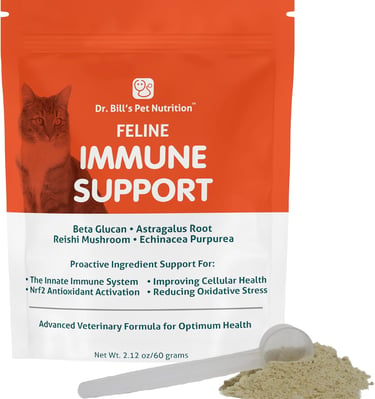What Is FIV? Understanding Feline Immunodeficiency Virus
Feline Immunodeficiency Virus (FIV) is often misunderstood. This blog shares what it’s really like to care for an FIV-positive cat, from how it spreads to how these cats can live long, happy lives.
CAREHEALTH
Mark P.
I’ll never forget the first time I heard the term “FIV.” I was at a local shelter, looking to adopt, when a volunteer pointed out a quiet, affectionate orange tabby and said, “He’s FIV-positive.” I didn’t know what that meant, but I could tell by her tone it was something serious. At the time, it sounded like a dealbreaker. I assumed it meant he was sick, or contagious, or somehow more difficult to care for.
Thankfully, I did some research and spoke with a few knowledgeable people, and I’m glad I did. Because what I discovered is that FIV isn’t nearly as scary as it sounds. In fact, that orange tabby came home with me later that week, and he ended up being one of the most loving, low-maintenance cats I’ve ever had.
If you’ve heard of FIV and want to know what it really means, especially if you’re considering adopting an FIV-positive cat, here’s what I’ve learned from experience.
What Is FIV?
Feline Immunodeficiency Virus, or FIV, is a slow-acting virus that affects a cat’s immune system. It’s often compared to HIV in humans, although the two are species-specific. FIV cannot infect humans, and HIV cannot infect cats.
Basically, FIV weakens a cat’s ability to fight off infections. Over time, this can make them more susceptible to illnesses, especially if they don’t receive regular vet care. But here’s the surprising part: many FIV-positive cats live long, healthy, happy lives without ever showing symptoms.
My cat lived to be 14 and never had a serious health issue related to FIV. He had regular vet checkups, a good diet, and a stress-free home, and that made all the difference.
How Is FIV Transmitted?
FIV is primarily spread through deep bite wounds, usually from fighting between unneutered male cats. It’s not spread through casual contact, grooming, sharing food bowls, or litter boxes. That’s something most people (including me, at first) don’t realize.
If your FIV-positive cat is a peaceful indoor cat, the risk of transmission to other cats is extremely low. I had two other cats in my home during my orange tabby’s life, and none of them ever contracted the virus. They ate together, slept together, and occasionally got into little tiffs, but never anything close to a serious bite.
So, while it’s wise to be cautious with introductions, especially to more aggressive cats, FIV-positive cats don’t have to live in isolation.
Signs and Symptoms of FIV
Most FIV-positive cats appear completely normal for years. If symptoms do arise, they can vary widely but may include:
Weight loss
Poor coat condition
Recurrent infections
Inflammation of the gums (gingivitis)
Fever
Lethargy
In my experience, regular checkups are key. The earlier you catch any sign of illness, the better the outcome.
Caring for an FIV-Positive Cat
If you’re thinking of adopting or are already caring for a cat with FIV, here are a few things that made a big difference for me:
1. Keep Them Indoors
This not only protects them from catching other illnesses but also prevents the spread of FIV to outdoor cats through fights.
2. Feed a High-Quality Diet
Good nutrition goes a long way in supporting immune health. My vet recommended a well-balanced, high-protein diet, and I stuck with that throughout my cat’s life.
3. Regular Vet Visits
This is probably the most important. We went in every 6 months for checkups, just to stay ahead of any issues. Bloodwork helped monitor his immune function, and any minor problems were addressed early.
4. Reduce Stress
Stress can weaken the immune system further. I tried to keep a quiet, stable home environment with plenty of cozy spots to nap, toys for stimulation, and affection when he wanted it (which was often).
Misconceptions About FIV
What breaks my heart is how many FIV-positive cats are overlooked in shelters simply because of the diagnosis. The truth is, they’re not “sick” or dangerous; they just need a little extra awareness.
One of the biggest misconceptions is that FIV is a death sentence. It’s not. With proper care, many cats live just as long as those without the virus.
Another myth is that they’re highly contagious. Again, not true unless there’s aggressive biting involved. Most multi-cat homes can safely include an FIV-positive cat, especially if all cats are spayed/neutered and well-socialized.
Why I’d Adopt Another in a Heartbeat
Looking back, I’m so grateful I didn’t let the FIV diagnosis scare me away. That orange tabby whose name was Murphy was one of the most affectionate, calm, and loyal cats I’ve ever known. He loved to curl up on my chest and purr for hours. He was gentle with guests, playful with the other cats, and brought a sense of peace to our home.
FIV didn’t define him. It didn’t make him less adoptable, less lovable, or less worthy of a full, happy life.
If you’re considering adopting an FIV-positive cat, my advice is simple: don’t let fear stop you. Ask questions, talk to your vet, and be prepared, but know that you’re giving a second chance to a cat that might otherwise be passed over.
And that kind of love? It stays with you forever.
Kitty Catz
Follow Kitty Catz on social media for purrfect updates and blog highlights!
© 2025-2030. All rights reserved.



